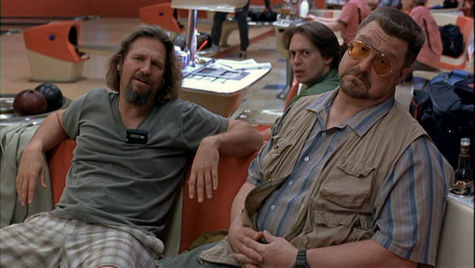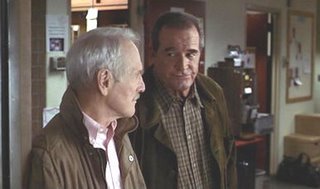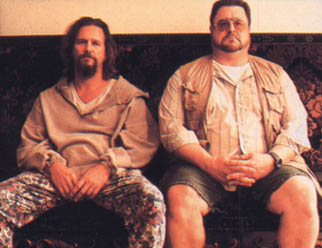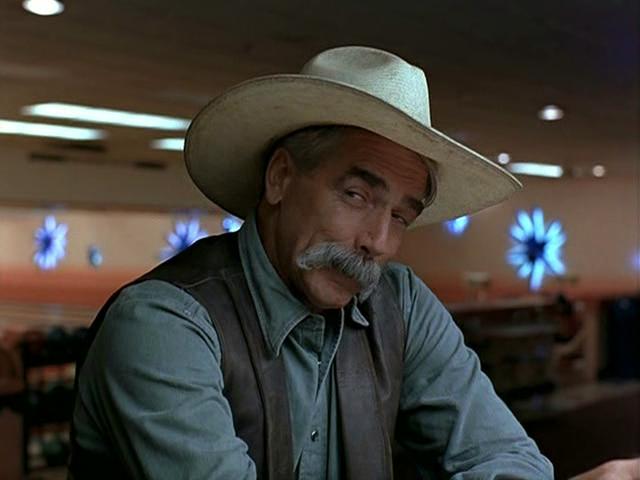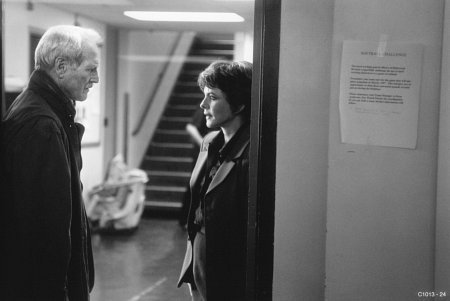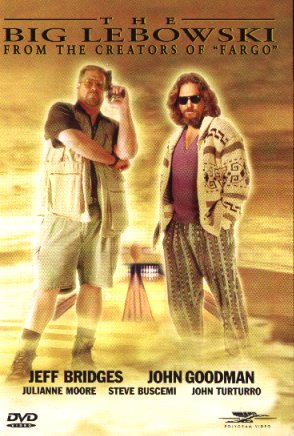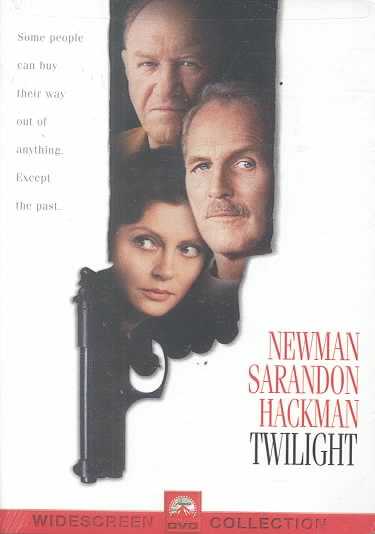It’s possible that I overrated Twilight and underrated The Big Lebowski in this Chicago Reader piece (March 6, 1998); I’d have to resee both these films in order to be sure. —J.R.
The Big Lebowski
Rating ** Worth seeing
Directed by Joel Coen
Written by Joel and Ethan Coen
With Jeff Bridges, John Goodman, Julianne Moore, Steve Buscemi, David Huddleston, Philip Seymour Hoffman, John Turturro, David Thewlis, Ben Gazzara, and Jon Polito.
Twilight
Rating *** A must see
Directed by Robert Benton
Written by Benton and Richard Russo
With Paul Newman, Susan Sarandon, Gene Hackman, James Garner, Stockard Channing, Reese Witherspoon, and Giancarlo Esposito.
It’s purely a matter of chance that two neo-Chandler mysteries with contemporary Los Angeles settings are opening this week. But although Joel and Ethan Coen’s The Big Lebowski and Robert Benton’s Twilight differ in tone, style, milieu, and generational perspective, both films arrive at their private-eye stories through the unorthodox detour of the western. In Benton’s case the western reference is harder to detect but central to the conception throughout; the film even climaxes with the equivalent of a western showdown and shoot-out. In the Coens’ case it’s much more blatant but proves to be window dressing. Less strangely, both movies express an inordinate amount of affection for their hapless, antiquated, and mainly ineffectual heroes, not only because they’re played by highly charismatic stars — Jeff Bridges and Paul Newman, respectively — but also because, like Chandler’s Philip Marlowe, their outdatedness, their naïvité, and even their relative passivity make them morally superior to the wealthy bozos who press them into service.
There are more oblique similarities between the pictures: both, for instance, feature comic Mexicans, running gags about their over-the-hill sleuths possibly losing their penises, and passing allusions to their former wives. Furthermore, they’re both profoundly boys’ movies, which hampers the efforts of two highly skilled actresses — Susan Sarandon in Twilight, Julianne Moore in The Big Lebowski — to do much with their underwritten parts. Finally, in keeping with the Chandler tradition, they both offer extensive catalogs of different kinds of Los Angeles neighborhoods, though The Big Lebowski does a better job of capturing the everyday feel of Los Angeles from a low-rent perspective; cartoonish or not, it often imparts the flavor of driving down Melrose, whereas Twilight generally seems more at home in the remote hideaways.
My preference for Twilight over The Big Lebowski could be generational. I’m much closer in age to Bridges than to Newman, yet Benton takes me back to a world that I recognize more vividly than the Coens’ TV patchwork, and I prefer Benton and Richard Russo’s witty, functional dialogue and sturdy plot construction to the Coens’ gaudy bag of tricks, whose cleverness and imagination exist mainly for their own sake. Both of these labyrinthine stories are mired in movie memories that the filmmakers try to reconcile with their visions of Los Angeles in the 90s, but Benton’s references mainly run to the late westerns of Howard Hawks and to his own previous feature, Nobody’s Fool (also starring Newman and coscripted by Russo), whereas the Coen brothers, characteristically, are all over the map, taking in Busby Berkeley, The Big Sleep, The Long Goodbye, The Killing of a Chinese Bookie, Cutter’s Way, After Hours, and their own Barton Fink. Both movies are studded with stars and familiar faces, but Benton follows the Hawksian practice of honing all his cast members into a homogeneous, interactive unit, while the Coen brothers are more interested in lining up a succession of autonomous freaks.
Twilight has a certain amount of trouble simply getting started. It opens with a prologue set at a Mexican resort in 1995, then cuts to Los Angeles two years later, only to launch an extended flashback a few days prior to this second beginning. Newman’s character, Harry Ross, is a former cop and retired private detective now living in the garage apartment of his best friends, a wealthy couple who used to be movie stars (Gene Hackman and Susan Sarandon). Though Ross periodically narrates the flashback offscreen, his monologue veers between a tape-recorded statement to the police and a more intimate, Marlowe-style confession of past failures that’s aimed at us; it hovers over the action like a disembodied, free-floating lament, never quite connecting with the on-screen story. All this is as cumbersome as it sounds, but at least it delivers the goods in a single, streamlined package. We never learn anything about Harry’s past as a husband and father, and intuit only a few traces of his background as a cop and a former alcoholic, but we discover a great deal about his emotional life in relation to his friends and former colleagues, which is all the film really cares about.
All that The Big Lebowksi really cares about is the nightmarishness of 90s Los Angeles and the way a couple of dysfunctional 70s types endure it, but the Coens have an even stranger method of arriving at their two subjects. The film begins with an old-timer cowboy (Sam Elliott) who narrates the film, establishing the setting (LA during the gulf war) before leading us to the hero, Jeff Lebowski (Bridges), better known as “the Dude.” An unemployed pothead and former campus radical, the Dude lives in Venice and spends most of his time bowling with friends. A couple of hired thugs mistake him for a Pasadena millionaire with the same name and break into his bungalow; one of them dunks the Dude’s head in the toilet, the other pisses on his carpet. It seems that the big Lebowski in Pasadena (David Huddleston) has a spoiled young wife who’s run up too many bills; after the Dude looks up the other Lebowski, hoping to get his carpet replaced, he’s sucked into an intricate mystery and forced to play amateur sleuth.
What does the cowboy narrator have to do with any of this? Absolutely nothing. He turns up later at the bowling alley to order sarsaparilla and make small talk with the Dude, but his relation to the action is emphatically zilch. The only reason he’s in the film is to motivate an opening gag involving tumbleweed and to bestow some kind of authorial sanction on the hero. I suppose one could put a high literary spin on this and say that the Coens, like Laurence Sterne with Tristam Shandy, are arguing that character is everything and narrative technique is arbitrary. And this strategy works well enough with the Dude and his best bowling pal, Walter Sobchak (John Goodman), a muddled and ranting Vietnam vet, but it reduces everyone else in the movie to a parade of satirical cartoons.
The Dude and Sobchak begin as caricatures too, but they’re allowed to grow into something deeper, if only because the humanist economy of the Coens’ surrealist vaudeville allows for a couple of human beings within the tapestry of freaks. No such luck for the other Lebowski, his bimbo wife, or his affected daughter (Julianne Moore, in a nasty parody of a feminist artist), all loosely derived from The Big Sleep; a sleek pornographer (Ben Gazzara) even more loosely derived from Chinese Bookie; or the seven assorted thugs injected periodically into the action, each one a separate gag or cliché. None of these monsters — and I’ve cited only a fraction of the full repertory — ever comes within hailing distance of a recognizable human; this caricaturing gives John Turturro an enjoyable turn as a vain Mexican bowler (who has practically nothing to do with the plot), but it shortchanges Steve Buscemi, who plays another bowling buddy of the Dude’s, a relatively important character we’re supposed to care about but mainly don’t.
Put another way, the Coens are basically interested in a couple of amiable lowlifes surrounded by various kinds of comic extravagance, including two hyperbolic dream sequences and acres of free-floating attitude. To be sure, The Big Lebowski is packed with show-offy filmmaking and as a result is pretty entertaining. But insofar as it represents a moral position — and the Coens’ relative styling of their figures invariably does — it’s an elitist one, elevating salt-of-the-earth types like Bridges and Goodman (or Frances McDormand in Fargo, or Goodman in Barton Fink) over everyone else in the movie. In a universe populated mainly by geeks, characters who turn out to be human beings are apt to be rather touching, but it’s an exclusive sort of privilege.
“[This film is] only intermittently relieved by waiting for moments when Lily Tomlin can outclass her dopey dialogue, and mainly stuck in endless Tales From the Crypt where pleasant memories of Hitchcock, Rio Bravo, and The Long Goodbye get dehydrated, battered together, balled up, and flattened into puny pancakes, like the inglorious waffle that Nickelodeon made out of John Ford and slapstick.”
I blush to admit that this is all I had to say about The Late Show, Robert Benton’s second feature as writer-director, when I wrote about it in Film Comment in 1977. In fact I haven’t seen this private-eye movie set in Los Angeles since then, and for all I know I could have been right. But Dave Kehr’s Reader capsule, written some time later, is probably more judicious: “Not just another genre rehash (cf. Farewell, My Lovely; The Long Goodbye; Gumshoe), but a genuinely ingratiating private-eye update with Art Carney as a middle-aged Marlowe trying to find out who killed his partner. The tone shifts (as tones were wont to do in the late 70s) from comedy to drama to romance, but director Robert Benton deserves a lot of credit for preserving the integrity of his characters, even when faced with a veteran self-parodist like Lily Tomlin. A small film of small but real virtues, easily overrated and eminently enjoyable.”
What steamed me back in 1977 was the prominence of the auteurist-trained movie brats — filmmakers like Benton, Peter Bogdanovich, Brian De Palma, John Milius, and Martin Scorsese — in relation to their models as well as their European counterparts. The copycats seemed to get more attention and respect than the originals and the innovators — much as the Coens are now ranked above Roman Polanski, and Woody Allen eclipses Albert Brooks — and having just returned from almost eight years abroad, I was responding like Rip van Winkle.
I finally warmed to Benton with Nobody’s Fool three years ago, and now the splendors of Twilight make me wonder if his auteurist pedigree blinded me to the feeling for character he’s developed through his emulation of Hawks and company, and his equally pronounced sense of place. Part of Twilight‘s charm is the way it reconfigures Rio Bravo, El Dorado, and Rio Lobo in the process of making its own discoveries, not so much imitating or appropriating the earlier films as applying their strategies to goals quite alien to Hawks. When Benton makes room for Reuben, Ross’s comic Mexican assistant (Giancarlo Esposito, having fun with a part that’s a probable throwback to Pedro Gonzalez-Gonzalez in Rio Bravo), the character’s eagerness and ineffectuality transcend Hawks’s ethnic stereotyping; despite all the ribbing about his status, Reuben is less a servant than a colleague.
Oddly, the respective films of Hawks’s late western trilogy don’t continue the same story so much as they recapitulate it, refine it, and inflect it with diverse intimations of aging. In terms of artistic achievement, El Dorado is a clear step down from Rio Bravo, and Rio Lobo marks an even sharper decline, though certain hard truths still emerge from the overall coarsening of effect and detail. At times Rio Lobo calls to mind King Lear in its rage and desperation, yet more often it’s a cranky, mean-spirited mess; El Dorado sometimes increases the relaxation of Rio Bravo to the point of lethargy, yet its bittersweet final image of John Wayne and Robert Mitchum hobbling down the street — adapted with somewhat different connotations at the end of Twilight — touches on realities and emotional shadings that Rio Bravo couldn’t accommodate.
In aspiration as well as achievement Twilight resembles El Dorado more than Rio Bravo or Rio Lobo, not least because it harks back to Nobody’s Fool just as El Dorado harks back to its own predecessor. When Newman and Stockard Channing speak about Catalina in Twilight, either as a fond memory or as a possible future outing, it’s an obvious reference to Newman and Melanie Griffith’s conversations about Hawaii in Nobody’s Fool, where it’s simply an oft-deferred fantasy. And when it addresses class loyalty, Twilight forms a complex dialectic with Nobody’s Fool: the earlier film concentrated on working-class ties in a small east-coast town, whereas this one focuses on upper-class ties in a large west- coast city, with implications much more sinister and ambiguous.
Much of the ambiguity stems from where exactly Harry Ross stands in relation to this class solidarity — as an invited guest or a trained servant. Chandler’s novels explore that same ambiguity whenever Philip Marlowe is buffeted back and forth among cops, crooks, and wealthy clients, but Benton and Russo investigate it even further by making a wealthy retired cop — beautifully played by James Garner — Ross’s friend, former crony, and veritable doppelgänger. The final scene between these wizened veterans is the movie’s thematic payoff, subtly but decisively altering our view of both characters.
As its title suggests, Twilight is centrally concerned with the effects and implications of aging, and even if Newman at 73 is arguably too old to play Harry Ross, he imparts so much muted yet virile intensity to the role that he winds up carrying the whole movie around in his pocket — to extend a metaphor that the movie also plays around with. His performance rightly begs comparison with John Wayne’s in the Hawks trilogy, reevaluating and commenting on practically everything Newman has done before. A sustained reflection on 40-odd years of picture making, it laces his best underplaying with a solid undertow of romantic yearning and tragic self-interrogation. Because Benton and Russo are smart enough to structure everything else around it, it’s reason enough to see this movie — a running dialogue between a seasoned pro and the world he’s still trying to figure out.

